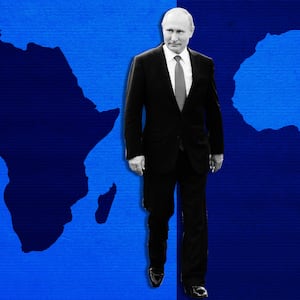ABUJA, Nigeria—Journalists and citizens in the Central African Republic (CAR) have increasingly become targets for Russian mercenaries in the country, according to an investigation by The Daily Beast.
Eyewitnesses to Russian aggression in CAR say the violence has continued since the 2018 killings of three Russian journalists who were investigating the local activities of the Wagner Group, a mercenary outfit tied to a close friend of Russian President Vladimir Putin. And coordinated pro-Russia social-media disinformation campaigns have popped up to defend the mercenaries and circulate lies about rival peacekeepers from Western nations.
A violent civil war has raged in CAR, one of the world’s poorest countries, since 2013 when a mainly Muslim rebel coalition called Séléka took control of the capital, Bangui, and toppled the government. In response to rebel uprising and looting, Christian vigilantes began a bloody ethnic cleansing of the country’s Muslim minority. The UN imposed an arms embargo on CAR in December 2013 in response to widespread human-rights abuses and established a peacekeeping mission, but much of the fragile nation remains controlled by rebel fighters (who now call themselves ex-Séléka) and Christian militants, who battle each other for control of territory and rich natural resources.
In 2016, former prime minister Faustin-Archange Touadéra was elected president of the country, but just as he was about to settle into office, the former colonial power France—which had sent troops to the country in late 2013 in an effort to prevent violence between the religious militias—ended its military mission in the troubled nation. Touadéra then turned to Russia for help in strengthening his country’s military and overturning the UN arms embargo. The Kremlin accepted the request, but not without the African nation agreeing to allow Russia to explore its natural resources. (The UN approved a Russian training mission to CAR in 2017.)
Since then, Valery Zakharov, a former Russian military intelligence officer, has been installed as the national security adviser to President Touadéra, and Moscow has sent weapons and hundreds of military advisers and mercenaries. Russia has also engaged in an intense war of words and battle for political influence in CAR with France, whose personnel are part of the UN peacekeeping mission as well as an EU training mission that offers strategic advice and operational training to CAR armed forces. Meanwhile, Russian mercenaries on the ground have reportedly been harassing citizens as an extension of Touadéra’s government.

First Secretary at the Russian Embassy in the Central African Republic Victor Tokmakov (L), Special Security Adviser to the Central African President Valeriy Zakharov and Minister of Communication and Government Spokesman Ange Maxime Kazagui (R), meet in the office of the administrative building, on Aug. 2, 2018 in Bangui, shortly after three Russian journalists were killed during a reporting trip in the country.
FLORENT VERGNES/AFP via Getty Images“These Russian soldiers go from place to place in [local towns like] Bambari harassing civilians and accusing them of belonging to rebel groups,” Ali Mukta, a local farmer, told The Daily Beast. “They [the Russian mercenaries] even beat you up if you attempt to argue with them.”
The Wagner mercenaries who are scattered around CAR—often guarding lucrative gold and diamond mines—have been linked to Russian President Vladimir Putin’s close associate Yevgeny Prigozhin. Often called “Putin’s Chef” because of the rich contracts handed out to his catering company, Prigozhin has denied backing the Wagner Group—which hires many of its mercenaries from the Russian military intelligence agency known as the GRU—but a number of local and Western officials believe that he is the mastermind behind both the mercenary outfit and Russia’s involvement in CAR.
In September, the U.S. Department of the Treasury said it was taking action, in the form of sanctions, against Kremlin-connected operations in CAR “by targeting entities and individuals working on behalf of Prigozhin to advance Russia’s influence in the Central African Republic.”

New recruits for the Central African Armed Forces (FACA) perform a drill during a medal presentation demonstration in Berengo on Aug. 4, 2018. Russian military consultants have set up training for the Central African Armed Forces and the Internal Security Forces after delivering weapons to the country.
FLORENT VERGNES/AFP via Getty ImagesAs The Daily Beast discovered, a number of citizens and journalists in CAR have been intimidated and threatened by the Wagner mercenaries, as the Russians have accused locals of siding with Muslim rebel groups and warned them about speaking out, particularly in connection to activities around the Ndassima gold mine near the southern town of Bambari.
When violence erupted in Bambari at the start of 2019 between government forces and ex-Séléka rebels, the government relied on its Russian allies—along with some assistance from UN peacekeepers—to retake the region. But soon after the mining town was liberated, allegations began to emerge of human rights abuses and intimidation by Russian fighters. Traders, journalists and even sick patients in the hospital reported being harassed by Russian mercenaries.
The most widely publicized allegation of torture was made by Mahamat Nour Mamadou, a market trader, who told UN investigators last year that he was held for five days in Bambari in January 2019 by a group of Russians, who allegedly kidnapped him near the gold mine and cut off one of his fingers, on suspicion of his being a member of a rebel group. A spokesperson for the UN said afterwards that the organization had seen enough physical evidence to conclude that Mamadou had been ill treated and tortured.
In the same month Mamadou was beaten up by Russian fighters, two other market traders said they were harassed by a group of about five Russian soldiers who accused them of working for Muslim militants as they arrived the Bambari hospital, where some of their fellow traders were receiving treatment for injuries sustained during the fighting between Russian-backed government forces and the rebels. The weeks-long conflict in 2019 led to about 30 people dying—including two police and 20 militants—and dozens being treated for gunshot wounds at the hospital.
“We had just arrived at the hospital and were about to get into the main building when the soldiers walked up to us, held our shirts and began to accuse us of belonging to the rebels,” Manasseh Bello, who sells foodstuff at the Bambari central market, told The Daily Beast. “We told them that we only came to the hospital to see some of our friends who were injured during the fighting and that we weren’t rebels but they didn't want to listen to us.”
As the traders were being questioned by the Russians, one of the mercenaries brought out a smartphone from his pocket and began to record the incident. At some point the soldier doing the recording asked the traders to stand close to each other and face the camera.

Flowers and photographs memorialize Russian journalists Alexander Rastorguyev, Kirill Radchenko and Orkhan Dzhemal, who were killed in the Central African Republic while investigating the activities of Russian mercenaries at a valuable gold mine.
VASILY MAXIMOV/AFP via Getty Images“They said we either confessed we were working for the rebels or we’ll regret not doing so,” said the 39-year-old Bello, who formerly worked as an auto mechanic in a shop near the market. “After interrogating us for about an hour, they ordered us to leave the premises and warned us never to visit the hospital again.”
Before they were chased away, the traders watched as the Russians attempted to enter the hospital to interrogate patients about their rebel links, before they were stopped by medical personnel. “The hospital staff said they were not going to allow patients who were in critical conditions [to] be interrogated by anyone,” Saibou Issa, who also owns a shop at the Bambari central market, told The Daily Beast. “The soldiers insisted but the medical personnel stood their ground.”
Last month, Sylvain Onana, a journalist in CAR, began to dig into reports about Russian harassment of locals in Bambari and went to neighborhoods close to the Ndassima gold mine. Onana planned to ask about allegations of violence towards visitors to the mine, including allegations that Mamadou, the market trader, was brutalized by the Russians nearby. To Onana’s surprise, Russian soldiers showed up at the compound where he was conducting interviews, seized his phone and camera, and warned him never to return to the area.
“They searched all over my body to see if they could find anything they could seize from me,” Onana, a freelancer who had spent just two days in Bambari before the Russians located him, told The Daily Beast. “They made sure they took every single thing I had on me.”
According to Onana, the Russians indicated that they had been tipped off to the journalist’s presence at the compound. Two armed soldiers, he said, rushed him, held his two hands and began to pick up his gadgets.
“The Russians have informants everywhere, especially in Bambari,” said Onana. “When I went to the compound the first day, someone working as a spy for them quickly informed them that [I’d] be returning the next day.”
In 2012, the gold mine, which was then owned by Canada’s Axmin, was overrun by Muslim rebels, who took control and forced the Canadian company to flee. As The Daily Beast reported last year, the mine appears to have now been taken over by Russian interests funneled through Lobaye Invest, a locally registered firm which happens to be a subsidiary of the St. Petersburg-registered company M Invest, a firm with links to Prigozhin.
“No one dares go to the Ndassima mine without being invited,” said Mukta, the farmer who lives a few kilometers away. “If the Russians find you anywhere close to the gold mine, they’ll accuse you of being a rebel and punish you severely.”
In July 2018, three Russian journalists—Orkhan Dzhemal, Alexander Rastorguyev, and Kirill Radchenko—were killed as they attempted to get to Bambari to investigate the activities of the Wagner Group and the Ndassima gold mine. And those who made later attempts to find out how the three journalists died also found themselves in deep trouble.
About two months after the killings, Louis Kottoy, a freelance journalist who had been investigating the death of the Russian journalists, was severely beaten up in Bangui by three gun-wielding local men who took away his phone and laptop and left him with a dislocated left shoulder and a cut above his right eye that required three stitches. According to Kottoy, the men who attacked him accused him of using his phone and laptop to “create problems for some people.”
“They said I began to ask for trouble when I started going to places I shouldn’t be and asking questions that were none of my business,” Kottoy, who was born and raised in Bangui, told The Daily Beast. He had been interviewing people in the town near the site where the Russians were killed and even received a phone call a day before his attack from an anonymous but “friendly” woman who advised him not to continue with his findings, as some people were becoming uncomfortable with his work. “I knew [the attack] was about the investigation because the interviews I have carried out recently have only been related to that incident.”
Even before Kottoy’s attack, it had become clear that anyone investigating what Prigozhin and his Wagner Group were up to in CAR—or attempting to find out how and why the Russian journalists were shot dead with automatic weapons after being ambushed outside the town of Sibut, near Bangui—was putting his or her life in danger.

A Central African soldier trains with the AK47 assault weapon on the European launch pad at Camp Kassai, in Bangui, on March 14, 2018. At this location, the European Union training mission in the Central African Republic (EUTM CAR) trains FACA soldiers to be deployed in the country.
FLORENT VERGNES/AFP via Getty ImagesTwo weeks before Kottoy was beaten up and his equipment seized, Pyotr Verzilov, a member of anti-Kremlin protest group Pussy Riot, reportedly was poisoned in Moscow while awaiting results from a private investigation into the murders of Dzhemal, Rastorguyev, and Radchenko. In Sibut, where the Russian journalists were killed, soldiers from the Central African Armed Forces (FACA), who have been receiving training from Russian instructors, warned people who lived close to the spot where the bodies were found not to speak to the media regarding the incident. Locals were warned that they would be punished if they gave interviews about the killings.
“Sometimes, these FACA soldiers who went round warning people were accompanied by Russian mercenaries,” Glory Tiku, a Cameroonian journalist and rights activist who was in Sibut at the time, told The Daily Beast. “All they wanted to do was intimidate and frighten people so as to ensure that the truth about what happened to the Russian journalists is never told.”
The truth of what Russia is up to in CAR is also obscured by a network of news blogs and social media accounts in the country, which quickly move to defend Russia when acts of intimidation and violence occur. When the three Russian journalists were murdered in Sibut, numerous Facebook accounts claimed France was responsible for the killings. Voix de l'Afrique (Voice of Africa), a so-called NGO which claims on its Facebook profile that it was created with the aim of exposing plots against African countries, shared a post to its over 22,000 followers claiming that the attacks on the journalists were the “sole mission” of individuals working for France, “which goes through all means to discourage investors who are interested in the CAR.”
The same scenario played out when Mamadou, the market trader, reported he was tortured by the Russians. A network of social media accounts, websites and newspapers quickly claimed that his allegations were in fact a plot by the French to ridicule the Russians in CAR. These trolls have consistently pushed almost identical pro-Russian stories and anti-French conspiracy theories—one of which accuses France of backing terrorists and planning a genocide—that are very similar to those sponsored by the Russian Internet Research Agency (IRA), a troll factory in St. Petersburg, during its disinformation campaign that targeted the 2016 U.S. presidential elections. The Mueller Report identified Prigozhin as the financier of the IRA and its disinformation attempts.
Russian government officials have helped amplify these anti-French conspiracy theories beyond CAR.
At a UN Security Council meeting on the situation in CAR, held in New York in Feb. 2019, Russia’s First Deputy Permanent Representative Dmitry Polyanskiy insisted that Mamadou’s claim he was tortured by Russian fighters was “distorted” and that the trader had admitted to Afrique Média, a Central African news outlet that has published a number of pro-Russian articles, that he was indeed a rebel fighter who had lost his thumb in battle. Polyanskiy claimed Mamadou was then approached and offered a large sum of money by an internal security attaché at the French Embassy in Bangui to say that he had been tortured by Russians.
Reports by a number of local media outlets claim journalists in the impoverished African nation get paid by government officials, who work closely with the Russians, to write articles that speak glowingly of Russian activities in the country while castigating the French. Writers reportedly get the equivalent of about $36 for each article they write.
“Regardless of which media outlet publishes these articles, they end up being shared via WhatsApp and Facebook,” said Onana, who himself had rejected an offer from a government official in Bangui to write an article giving the impression that Russia is helping to get rid of terrorists in CAR. “Internet users here generally have WhatsApp and Facebook accounts and that’s where the Russians want their propaganda to be seen.”
This is part one of a Daily Beast series on Russian disinformation in the Central African Republic.




